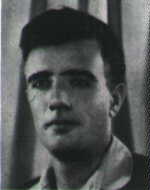Son of Aziza and Menashe, was born on March 15, 1939) in Basra, Iraq. When he heard about the establishment of the State of Israel, he decided to leave Iraq, took some clothes and supplies, left a letter to his parents, and joined a group of young children who actually left for Israel. They “stole” the Iraqi border to Persia (Iran) and reached Tehran, where they found the aliyah activists who flew them to Israel. Upon his arrival, Efraim was sent with a group of about fifty boys and girls to Kibbutz Ramat Yochanan, who received groups of the Youth Aliyah after their appointment in the transit camp. In the group of “rehabilitative children” he was considered a diligent and dominant child, who was interested in achieving achievements and did not join school or work evasions. At the beginning of the high school period, his parents immigrated to Israel in 1951, and he was Simcha to return home to their home in Ein-Hayam, Haifa, where he enrolled in a vocational high school and chose the electronics track. His natural understanding of the real professions, the discovery and love of human subjects and their investigation (while specializing in the songs of the Land of Israel). In 1959, Ephraim enlisted in the IDF and chose Tys, which was clear to him years before, when he chose to join Gadna Air, where he spent the afternoon in his youth, and knew that his way to the flight was paved. In the pilot course, Ephraim excelled in the ability of theoretical learning. One of his classmates even claimed that Ephraim was the private teacher of some of his classmates and that without him there was no chance of overcoming the “distress” of the real professions. At the end of the course Efraim was sent to Kela – a great disappointment for him, which eventually led him to be released upon completion of his obligation to sign, and to seek his way through citizenship. The way was not easy, his expectations of himself were great, the possibilities outside were limited in his opinion, and pressure from the army to return to service, and from the “Shushu” to mean this type of service, led him to minor elections, In Israel, but was insufficient. During this period he connected to the camera and later to the film in which he documented his “Land of Israel”. Hearing him describe a trip parallel to the pictures he presented was an experience in itself. Another love he had acquired secretly, classical music, and the collection of records he created for himself only attests to the quality of his taste. Before the Six-Day War, he returned to constant pressure on the air force with a promise to move to a transport squadron. His seriousness and ability (and the members of the organized conversion course) paved the way for other “light” pilots to reach transport squadrons and helicopters. In September 1967, as part of “We Peacefully Passed Through” the war, Nella and Ephraim decided to get married, and they had two sons, Shmulik and Yaron, who almost did not enjoy his great love for the children, described by his many nephews as a real celebration. On the eve of Rosh Hashana, a Stratocruiser plane took off for a photographic mission in Sinai (the Egyptians apparently “closed an account” for the Egyptian “Sukhoi” miscarriage a few days earlier). Ephraim was a captain in the Strato who was consumed by a missile ambush, as reported in Haaretz. In the same article, Moshe Dayan was quoted as saying on the television news broadcast: “… one plane that is shot down does not change the chances of war or the balance of power …” Seven young men whose lives were cut off by their noses, seven families whose world was destroyed with the most precious of all, children who did not know their forefathers. Major Efraim Magen, Major Ze’ev Ofer, Captain Amos Guy, Captain Yoram Khayat, Captain Eliav Inbal, Sergeant Major Yitzhak Tamir and Cpl. David Sari tried to rescue themselves from the damaged plane that was diving down in Sinai but could not Who trampled their lives in one … Ephraim was laid to rest in the military cemetery in Haifa and he is thirty-two years old. Survived by a wife and two sons, parents, six sisters and a brother.
